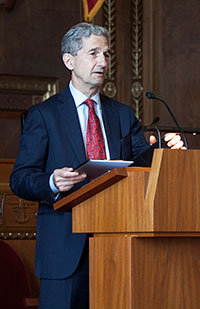Americans and Europeans Can Find Common Ground on Internet Privacy, Speaker Says

Cameron Kerry

Cameron Kerry
To reap the financial and social benefits from the enormous amount of information generated and shared electronically, leaders need to be “good stewards of the data,” said an authority in privacy, cybersecurity, and Internet governance.
Speaking at the Ohio Supreme Court’s Forum on the Law, Cameron Kerry said Wednesday the disclosures by CIA contractor Edward Snowden has made Europeans leery of U.S. companies’ commitment to privacy and whether doing business with an American company will lead to U.S. government intelligence agencies peering into their personal information.
Kerry is the Brookings Institute Ann R. and Andrew H. Tisch Distinguished Visiting Fellow in Governance Studies and the Center for Technology Innovation, and he is a visiting scholar at the MIT Media Lab. The brother of Secretary of State John Kerry, Cameron Kerry was general counsel and acting secretary of the U.S. Department of Commerce, and is involved in the federal government’s ongoing effort to secure agreements with the European Union and other nations on the sharing of data and protection of privacy.
Kerry remarked that as a lawyer working on the presidential campaign of his brother, he was in Ohio in 2004 leading a group of volunteer attorneys who were committed to protecting the rights of Ohioans whose ability to vote was being challenged. Analogous to that effort to protect a fundamental right, he said, lawyers in Ohio and elsewhere are at the forefront of protecting the rights of citizens to enjoy the benefits of online communications and commerce without fear of security and privacy breaches.
“In the privacy world, we speak about being good stewards of data. The notion of being a faithful fiduciary encompasses acting for the benefit of the person whose information it is,” he said.
With the growth of the Internet, Europeans and Americans perceive differences in how their countries and other countries treat their commitments to keep private data secure. American companies, particularly Facebook and Google, are extremely successful in Europe, Kerry said, and all are expected to comply with European Union directives on protection of personal data. The US-EU Safe Harbor framework is a general set of rules American companies are to comply with when doing business in Europe. Most companies pledge to comply, lest they face sanctions from the Federal Trade Commission if they violate data protection.
Snowden’s leaks about the activities of the National Security Agency raised deep suspicions among Europeans that set back negotiations, Kerry said. Part of this is driven by a cultural difference in how legal protections are developed. European countries in general have specific laws regarding privacy and a sense that violating privacy is a crime.
“There is … a perception [in Europe] that the United States doesn’t care about privacy,” he said. “We have a body of laws that form a strong mosaic of privacy.”
While the United States does not have a single federal law protecting privacy, principles of the U.S. Constitution collectively protect privacy. Many state and federal laws along with common law precedent build a mosaic of privacy protections, Kerry said. One key point for the future, he said, is whether Europeans will be able to avail themselves of courts in the United States and legal protections in American law when they have disputes with American companies.
Kerry reminded the audience that the miraculous advancements from sharing massive amounts of data run the continuum from “creepy to cool,” and to benefit from the enormous potential, sound legal judgments have to be made about how information is collected and used.
Fundamentally, Americans and Europeans generally agree on most of the same principles of privacy protection, but legal approaches sometimes make it hard for everyone to see the commonality, he added. He said Americans should be proud of what they do to protect privacy; some of the commitments made, such as notification of a data breach, go farther to protect citizens than any other country offers. Further, while President Obama’s administration has proposed a Consumer Data Privacy Bill of Rights, America can do more to secure privacy and help people benefit from the World Wide Web, he suggested.
The Forum on the Law was established in 2009, by the late Chief Justice Thomas J. Moyer as an ongoing lecture series. Events feature regional or national speakers who address contemporary or historic legal topics.
View Kerry’s presentation.


